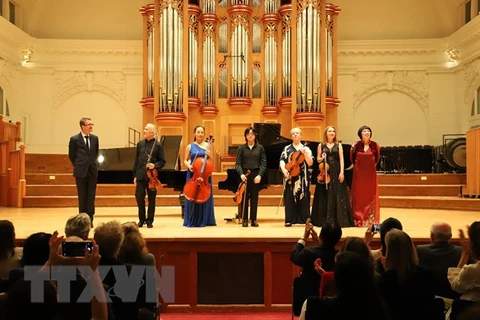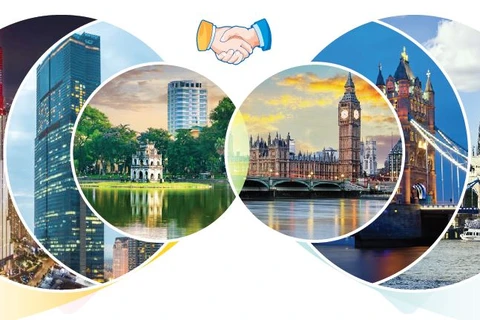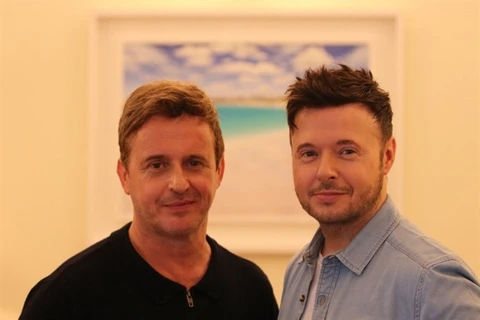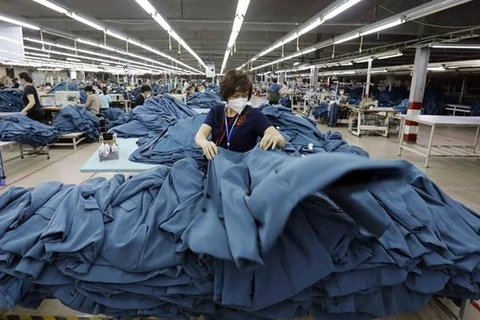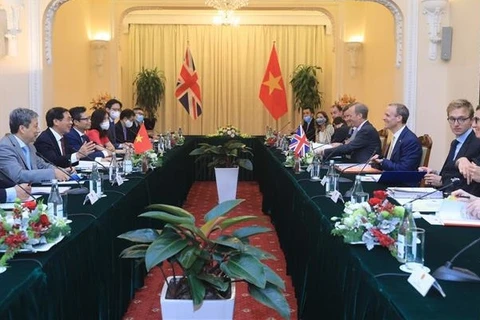Hanoi (VNA) – On September 11, 1973, the UK was one of the first western countries to establish diplomatic relations with Vietnam while Vietnam was still in the struggle fighting for independence and national reunification.
Throughout the history, especially since both countries decided to elevate their relations to a strategic partnership in 2010, they have witnessed robust developments in their ties.
Looking back on the five decades of bilateral diplomatic ties, it is evident that the strong and trustworthy relationship between the two countries has brought significant and long-lasting benefits to their people.
Substantial development of political-diplomatic ties
Founded in 1973, ties between Vietnam and the UK have been growing robustly. Both sides have facilitated the exchange of high-level delegations.
In March 2008, the two countries’ leaders issued a joint statement affirming their commitment to enhancing the bilateral relationship towards a "Partnership for Development," aiming for depth, effectiveness and stability in their cooperation.
 UK Prime Minister David Cameron receives Party General Secretary Nguyen Phu Trong in January 2013. (Photo: VNA)
UK Prime Minister David Cameron receives Party General Secretary Nguyen Phu Trong in January 2013. (Photo: VNA) On the occasion of the UK visit by Deputy Prime Minister and Minister of Foreign Affairs Pham Gia Khiem in September 2010, the two countries signed a Joint Declaration on the establishment of the Vietnam-UK strategic partnership.
In 2020, the two countries’ foreign ministers issued a joint declaration to commemorate the 10th anniversary of the strategic partnership establishment (2010-2020), with a vision to further elevate the relationship.
Since 2021 despite the challenges posed by the COVID-19 pandemic, the UK has continued sending high-level delegations to Vietnam, such as Foreign Secretary Dominic Raab in June 2021, Secretary of Defence Ben Wallace in July 2021, and the UK Government's COP26 President-Designate Alok Kumar Sharma in February 2022.
On the Vietnamese side, Prime Minister Pham Minh Chinh attended the 26th United Nations Conference of Climate Change of Parties (COP26) and paid a working trip to the UK in November 2021. National Assembly Chairman Vuong Dinh Hue paid an official visit to the European country in June 2022.
In May 2023, President Vo Van Thuong and a high-ranking Vietnamese delegation attended the Coronation Service of King Charles III, at the invitation of the UK Royal Family.
President Thuong's trip demonstrated Vietnam's appreciation for the UK Royal Family and the Vietnam-UK strategic partnership, thereby further tightening the fine relations and political trust between the two countries.
According to Vietnamese Ambassador to the UK Nguyen Hoang Long, the Vietnamese President's trip to the UK was the most significant event marking the 50th anniversary of Vietnam-UK diplomatic ties, which generated a new impetus for the strong and resilient development of bilateral strategic partnership in the decades ahead.
Both sides have also been working closely together at multilateral forums and international organisations, especially at the United Nations (UN), Asia-Europe Meeting (ASEM), the Association of Southeast Asian Nations (ASEAN), the European Union (EU), the World Trade Organisation (WTO), and more. Both countries were members of the UN Human Rights Council for the 2014-2016 tenure.
The UK promoted cooperation with and took advantage of Vietnam’s role as the ASEAN Chair 2020 to expand its relations with ASEAN. Vietnam backed the UK's proposal to become a dialogue partner of ASEAN. Furthermore, the UK expressed its interest in joining the Comprehensive and Progressive Agreement for Trans-Pacific Partnership (CPTPP) in February 2021 and hoped for Vietnam's support in this regard.
Economic, trade, investment cooperation - a bright spot
Economic, trade and investment cooperation have been a bright spot and a priority pillar in the Vietnam-UK strategic partnership. The UK is now the third biggest trade partner of Vietnam in Europe, the ninth largest importer and an important European investor.
From 2010 -2018, bilateral trade grew by 17.8% annually on average, exceeding Vietnam's overall average of 10% per year. During this period, Vietnam consistently enjoyed a trade surplus with the UK.
 Vietnamese Ambassador to the UK Tran Ngoc An and UK Ambassador to Vietnam Gareth Ward sign the UK-Vietnam Free Trade Agreement. (Photo: VNA)
Vietnamese Ambassador to the UK Tran Ngoc An and UK Ambassador to Vietnam Gareth Ward sign the UK-Vietnam Free Trade Agreement. (Photo: VNA) The signing of the UK-Vietnam Free Trade Agreement (UKVFTA) in late 2020 significantly contributed to an almost 11% increase in two-way trade from 2020-2021. It reached 6.83 billion USD last year, up 3.4% annually, with Vietnam’s exports amounting to 6.06 billion US, up 5.2% year-on-year.
Vietnam's key export items to the UK included seafood, wood and wooden furniture, apparel, footwear, tin, computers, phones, and electronic components. Major imports from the UK were machinery, equipment for production, pharmaceuticals and chemicals.
Investment cooperation has achieved impressive growth. As of the late April, the UK invested in 519 valid projects in Vietnam with a total registered capital of around 4.2 billion USD, ranking 15th out of 143 countries and territories investing in the country.
The UK’s projects in Vietnam are on small and medium size and concentrated in processing and manufacturing, real estate, mining, wholesale and retail, automobile and motorcycle repair, accommodation and dining.
In terms of development cooperation, the UK has been one of Vietnam's leading donors with 50 million GBP per year during the 2006-2010 period. It successfully completed a 10-year Agreement on Development Partnership (ADP) with Vietnam for the 2006-2015 period.
Though the UK ceased providing Vietnam with official development assistance (ODA) in 2016, it continues to assist Vietnam through development funds such as the Prosperity Fund and the Newton Fund. The UK remains committed to helping Vietnam in technology, research and innovation, public administration, business environment improvement, green growth and renewable energy.
Close cooperation in global issues
Vietnam and the UK have kept fostering their close coordination in global issues, particularly in climate change response. They are working together towards the Just Energy Transition Partnerships (JETP) as well as offering effective and mutual support at global and regional forums.
The two countries both have appreciated and highlighted the importance of respecting and maintaining peace, stability, security, as well as ensuring freedom of navigation and overflight in the East Sea in accordance with international law, considering the 1982 United Nations Convention on the Law of the Sea (UNCLOS) the legal framework for all activities at sea and oceans.
In health care, they have been actively and effectively carrying out cooperation activities through Government agencies, non-governmental organisations and the UK funds.
Amid the COVID-19 pandemic, the UK actively helped Vietnam in vaccine access and health care in general as the UK is one of the leading countries in research and production of vaccines for disease prevention. AstraZeneca vaccine, developed in the UK, was the first to be licensed for circulation in Vietnam. The UK assisted Vietnam by including the country in the priority list for the supply of COVID-19 vaccines, contributing to the success of Vietnam's vaccination programme.
In late July 2021, the UK announced the provision of 415,000 initial doses of AstraZeneca vaccine for Vietnam out of a total of 100 million doses that the UK Government supported globally, in addition to the COVAX mechanism to which the UK is one of the biggest contributors.
UK – Vietnam’s top partner in health care
The interaction between the people of the two countries through education is one of the most important aspects of bilateral relationship.
Vietnamese Ambassador to the UK Nguyen Hoang Long stressed that among the seven pillars of Vietnam-UK cooperation, education, sci-tech, research and innovation are important areas with significant potential for development. The UK is Vietnam's top partner in tertiary education with over 100 joint programmes with their partners.
 Deputy Minister of Education and Training Nguyen Van Phuc and Minister for Education in the Welsh Government Kirsty Williams witness the signing of bilateral cooperation agreement in 2018. (Photo: VNA)
Deputy Minister of Education and Training Nguyen Van Phuc and Minister for Education in the Welsh Government Kirsty Williams witness the signing of bilateral cooperation agreement in 2018. (Photo: VNA) At present, there are over 12,000 Vietnamese students in the UK. Education cooperation has also expanded to include secondary education as Vietnam aims to improve the quality of education and English teaching and learning, an area of cooperation that has been growing between Vietnam and the British Council.
Long affirmed that Vietnam considers the UK, a nation with world-class education and research, an important partner in education, research and innovation.
The Vietnamese community in the UK numbers around 110,000 who have engaged in positive activities to contribute to the homeland.
At an international workshop on 50 years of Vietnam-UK diplomatic ties: achievements and prospects held on March 21, Vice President and General Secretary of the Vietnam Union of Friendship Organisations Phan Anh Son asserted that over the past five decades, the Vietnam-UK ties have been continuously strengthened and developed, especially since the two countries upgraded their relations to a strategic partnership, thus opening up various cooperation frameworks and mechanisms, namely the strategic dialogue, the Joint Economic and Trade Committee, the Defence Working Group, and more.
The two countries have kept stepping up coordination in such important areas as security and defence, development cooperation, education-training, sci-tech, sustainable development and people-to-people exchange, laying a solid foundation for the development of bilateral ties. It could be said that their friendly relations are in a very fine period.
UK Vice Ambassador to Vietnam Marcus Winsley said the Vietnam-UK relationship is at its best over the past five decades. The context of the COVID-19 pandemic became a moment for the two countries to elevate their collaboration to greater heights in various fields, including politics, economy, education, national defence-security, especially in anti-human trafficking and cross-border crime.
Also at the workshop, Winsley affirmed that the UK is ready to assist the Vietnamese Government in improving English language skills for its people.
He suggested that in the future, the two countries should share more information on attracting investment, opening up markets, and developing technology in order to fulfill their commitments to sustainable development and achieving the goal of net-zero emissions by 2050. He also emphasised the need to cooperate towards the JETP.
Ben Bland, Director of the Asia-Pacific Programme and UK-Vietnam Bilateral Relations at Chatham House, offered several suggestions to reinforce bilateral tíes in the future.
According to him, the two countries share similarities but also have differences. Therefore, both sides need to have frank and honest discussions about these differences while also identifying common ground and areas where bilateral cooperation could be maximised.
Bland underscored the importance of collaboration not only with the two Governments but also with research institutions, universities and associations. These organisations could offer new initiatives to further nurture and elevate the Vietnam-UK relationship./.
